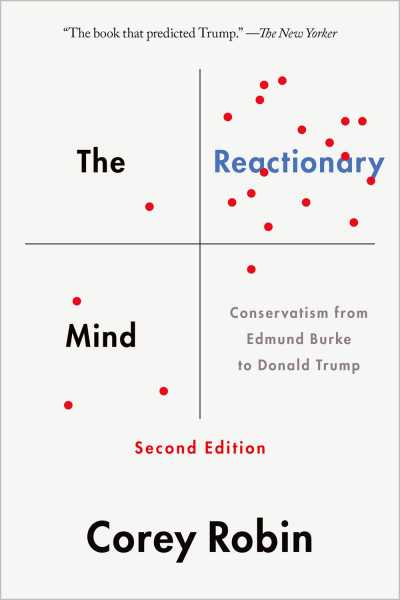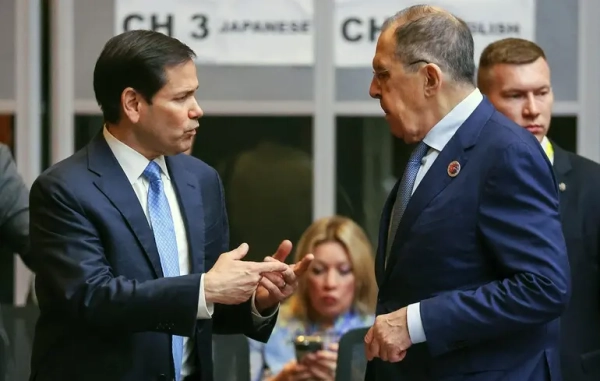
Was the conservative movement destined to produce someone like Donald Trump?
Corey Robin, a political theorist at Brooklyn College, says yes, and the latest edition of his book The Reactionary Mind is an attempt to prove it. Robin argues that conservatism, from its very beginning, has been a sustained effort to mobilize elites and the masses against what he calls “the emancipation of the lower orders.”
In other words, conservatism has always been a reaction against social progress, especially when that progress means poor and marginalized people asserting their power against entrenched elites. Many people see Trump as an unusual conservative or Republican, but Robin asserts the opposite: Trump is the “most successful practitioner of the mass politics of privilege in contemporary America.”
I spoke with Robin recently about how Trump fits in the long arc of the conservative movement, and I asked him to defend his critical view of conservatism. Full
A lightly edited transcript of our conversation follows.
Sean Illing
You seem to think that conservatism, in all of its manifestations, exists for basically one reason: to justify and defend the power structure. Is that a fair characterization?
Corey Robin
I’d say no, and let me try to restate it. I argue that conservatism is a reactionary movement, and by that I mean that it’s primarily a reaction against actual social movements involving the lower classes, or people on the bottom. And because this is what it’s reacting against, it typically takes two complicated forms.
The first is that conservatism often ends up being very critical of the prevailing distribution of power, particularly of elites. They accuse those elites of being flaccid and weak and too comfortable with their power, which is the very thing that allows revolutions or social movements to emerge in the first place.
The other thing is that conservatives, historically, have borrowed and learned from the very revolutionary movements they’ve opposed. We can talk more about that later, but the point now is that conservatism is a lot more than just an apology for an existing ruling class. Conservative movements often arise precisely at the moment when those existing apologies have proven to be extraordinarily weak, and then it’s a battle define to what the new order will look like.
Sean Illing
Let’s focus on the word “reactionary,” because this is what has stirred a lot of criticism of your book. There’s a tradition of conservative thinkers, people like Edmund Burke or Michael Oakeshott — both prominent English philosophers you discuss in the book — who believed that culture was a delicate thing that had to be managed cautiously and that too much change too quickly was destabilizing for society. Do you consider that “reactionary”?
Corey Robin
What I’m trying to do is come up with a thread that unites all the various manifestations of what we call “conservatism.” There is one strand of conservatism that fits the definition you’ve laid out, but it’s by no means the dominant strand. And even the great conservatives, like Burke, who made those sorts of arguments, also argued for breathtakingly radical actions that were not about preserving the status quo, but instead were about completely overthrowing that existing status quo.
Sean Illing
And why would a conservative want to overthrow the status quo?
Corey Robin
It depends. More often than not, it’s about a desire to return to a much older system of power that has long been uprooted. But the point, again, is that it’s a mistake to assume conservatives are never radicals.
Sean Illing
In the book, you lump all conservatives into the same conceptual bucket, and I think it’s pretty hard to draw a straight line from, say, Edmund Burke to Sean Hannity or Sarah Palin. I realize you’re not saying these people are the same, but you are saying they spring from the same impulse, and that feels like a stretch to me.
Corey Robin
Well, first, you’re right that saying people belong to the same family or are part of the same structure does not mean that they’re the same. If we take seriously the claim that conservatism is a reaction to specific movements across time, then we have to acknowledge that it’s going to change based on what it’s reacting against.
So it makes a difference whether you’re reacting against the French Revolution, or the emancipation of African slaves, or the women’s suffrage movement. The key question is, what unites these reactionary movements across time? And again, I think it’s pretty clearly a desire to resist the liberation of marginal or powerless people.

Sean Illing
I know the point you want to make is that conservatism, at its core, is self-consciously reacting against progressive challenges from the lower classes, but is that really the only thing conservatism is reacting against? Does conservatism, historically, have no content apart from a defense of hierarchy and privilege? Does it not, at times, emerge from a sincere view of human nature and a belief in the importance and fragility of customs and traditions?
Corey Robin
It’s an interesting question. I see something a little different when I look closely at the history of conservatism. I see a philosophy that views unequal relationships in society as essential to the preservation of human excellence and greatness. In other words, that inequalities are necessary because there are greater and lesser beings in the world, and any attempt to topple social hierarchies both threatens established power relations and destroys the basis of civilization.
And to be clear, I don’t think this is a cynical argument at all on the part of conservatives. I think they believe this sincerely. They believe that a society of human equals means a sociological leveling that will flatten culture and bring about decline. That’s the core of the vision you see in the greatest conservative thinkers, like Burke, for example.
Sean Illing
I see political life as a struggle to maintain a very difficult tension between regression and progress. The tendency to careen too far in either direction has always produced bloody outcomes, and I’m curious, one, if you buy that, and two, if you agree that some conservative influence is necessary to preserve this tension?
Corey Robin
I think I have a pretty different reading of what produces bloody outcomes, and this is just from a more historical reading than from any theoretical analysis. I don’t want to get too bogged down in historical details, though. I’ll say this: Regimes or power structures have a persistence that is much more strenuous than we realize, and so much of the dynamic of revolutionary violence has to do with the unwillingness of the forces of the old order to vacate the stage.
Sean Illing
A big reason for this unwillingness to let go, as you argue in the book, is not necessarily about political power in the conventional sense; it’s about maintaining power in private relations. So, for example, male opposition to women’s suffrage or white opposition to the emancipation of slaves was so fierce because it also meant changing the balance of power at home. If women were suddenly liberated in the public sphere, then that meant they were also liberated at home. If slaves were liberated, then the whole racial hierarchy in private life would collapse.
Corey Robin
That’s exactly right. And many conservative theorists are very self-conscious of this fact. So Burke, for example, is warning well before the French Revolution turned violent that what these people are after is a total overhaul of power relations. Soldiers want to revolt against their officers, servants against their masters, and so on. He goes through this list of all these private regimes of power and says the connection between subordinate and superior, at the most personal level, is in danger of being lost.
You can see this in the backlash against Reconstruction as well. The black leaders of Reconstruction in the South said, in the end, no one would really give a shit if there was a black congressman in DC. It was all about the relations at home on the sidewalk, on the former plantation, on the farm and so forth. That’s where this all matters, and that’s what drove the ferocity of the whole thing.
Sean Illing
Let’s pivot to contemporary conservatism, which I think we both agree is an unmitigated disaster. How did the conservative moment lead to the rise of Trump?
Corey Robin
I think what’s interesting about Trump is he’s both a continuation of longstanding tendencies on the right and also a break with those tendencies.
Sean Illing
What do you mean by that?
Corey Robin
Well, Trump was absolutely contemptuous of Republican Party elites during the primaries. He was arguably harder on Ted Cruz and Jeb Bush than he was Hillary Clinton. As I said earlier, reactionary movements begin with hostility to established elites, as counterintuitive as that may sound. Conservatives are always interested in preserving something, but often it’s the elites who have become too comfortable in their privilege that are the target. And you can see some of this in Trump’s contempt for establishment elites’ traditions.
What was new with Trump was his willingness, at least rhetorically, to challenge the market fundamentalism on the right. Of course, he’s done nothing substantively since taking office, but he introduced a populist rhetoric we haven’t seen on the right in this country in a long time.
Sean Illing
Even if you reject what they stood for (and it’s clear we both do), conservative intellectuals from the past — people like Milton Friedman or Friedrich Hayek — at least had a coherent, defensible view of the world. How did that tradition morph into the fact-averse, conspiracy-mongering grift that it is today?
Corey Robin
I have a pretty straightforward and simplistic answer to that. If conservatism is really a reactionary ideology, it means that its most profound moments and its greatest intellectual touchstones are going to be forged in the crucible of a revolutionary challenge. Which is why you often see flashes of powerful conservative movements precisely when there are profound challenges from the left.
So when Ronald Reagan comes into office, there’s all this intellectual energy on the right, not on the left. But then something happens with victory: You lose the urgency and the motivation to develop strong arguments, and the movement becomes decadent and hollow. This is what you often see on the eve of revolutions. And I think we’re in a similar moment now.
I’m not saying we’re on the eve of a revolution, but there’s no way to look at the existing right-wing firmament, from the lowest to the highest, and not see that it’s become a victim of its own success, in part because it hasn’t had a serious, profound left-wing challenge in at least half a century.
Sean Illing
In the book, you describe how economic elites continually persuade lower- and working-class whites to buy into a system that so clearly disadvantages them. This is an extremely frustrating dynamic for people on the left to understand, because it involves people being mobilized in ways that reinforce their material conditions. How do you make sense of it?
Corey Robin
Well, I think they do offer people real advantages, but the left has a hard time wrapping its head around this. What many lower-class white people get is a sense of social prestige, and some of the material forms of power that come with that. This goes back to what we were saying earlier about private power relations.
John C. Calhoun, a defender of slavery who was vice president in the early 19th century, understood this very well. He said we have two classes in the South, but it’s not rich and poor, it’s white and black, and everybody who’s white is an aristocrat, and everybody who’s not is not. That’s a social reality that really matters in the minds of a lot of people, whether they know it or not.
The left has a very hard time making a dent in that. I don’t think simply because people are racist, but because the left counter-offer is a very risky gamble: Give up your current privileges that you have, however impoverished your district is in other ways, for the sake of this revolutionary transformation that we can’t guarantee you is going to succeed — and we can’t promise you that it’ll be the brave new world that we hope it will be, but we do ask, in the meantime, that you sacrifice and give up this privilege you have.
I think that’s a very, very tough thing to advocate for. Sometimes the left gets lucky and succeeds, but the long run of human history suggests how hard it is. It doesn’t mean it’s not right, but it’s very hard.
Sourse: vox.com






